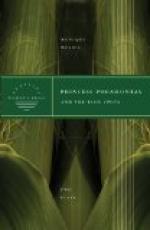Smith led the way to the storehouse and bidding the Indians wait outside, he went within and persuaded the man in charge to permit him to take a number of articles. When he came out his arms were full of colored cloths and beads, steel knives and trinkets of many sorts. The Indians gave him their baskets to empty and he filled them with the presents, going back for iron pots and kettles of glistening brass. These he bade them carry to Powhatan. To each of his guides he gave something for himself. Then speaking slowly, he said to Copotone:
“Kehaten Pokahontas patiaquagh niugh tanks manotyens neer mowmowchick rawrenock andowgh (bid Pocahontas bring hither two little baskets and I will give her white beads to make her a necklace).”
He would gladly have sent a message of thanks for her care of him that night, but he thought it best not to do so, since she might not wish it known that she had followed him.
“Pray her to come and see us soon,” he added as he bade farewell to his guides whose eagerness to show their treasures at home was even greater than their curiosity to see further marvels.
After he had seen them safely outside of the palisades, Smith stopped to enquire by name for such men as had not come out to greet him.
“Oh! Ralph, he’s dead and buried,” they answered; and of another: “Christopher? He wore away from very weakness. And Robin went a sen’night ago with a quartain fever. This is no land for white men.”
“But thou lookest hale and hearty. Captain,” remarked one of the gentlemen, leaning against his door for support. “I’ll wager the death thou didst face was not by starvation.”
Then Smith learned in full the pitiful story of what the colony had suffered during his absence: lack of food and illness had carried off nearly half the colonists, and those that remained were weak and discouraged. Death had taken both of his enemies and of his friends, but some who had been opposed to him formerly had been brought to see during his absence how with his departure the life and courage of Jamestown had died down. Men there are—and most of them—who must ever be led by some one, and in Smith these adventurers had come to see a real leader of men.
While Smith stood questioning and heartening the downhearted, President Wingfield came out of his house on his way to the Government House. Smith doffed his hat and made a brave bow to honour, if not the man, at least the office he represented.
“So thou art returned. Captain Smith,” said the President, coldly. “Methinks thou hast not fared so ill, better belike than most of us. Hast thou brought the provisions thou didst promise? We have been awaiting them somewhat anxiously. But first tell me where thou hast left Robinson and Emery, for the lives of our comrades, however humble, are of more value to us than even the sorely needed victuals.”
Now Smith was aware that President Wingfield knew, as every other man in the colony knew, that Robinson and Emery were dead; the others had already discussed their fate with him. Therefore he realized that the President had some policy in putting such a question to him thus in public.




